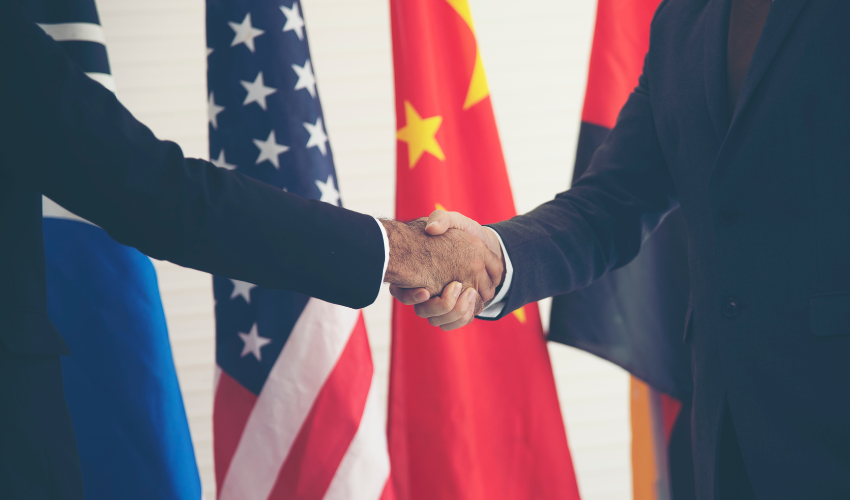Effective communication is the cornerstone of diplomacy, a field where every word carries significant weight. In the world of international relations, translation services play a crucial role in bridging the gap between different languages and cultures, facilitating understanding, and fostering cooperation among nations.
Real-Life Examples Highlighting the Importance of Translation in Diplomacy
UN Session in 1956
Throughout history, translators have been pivotal in shaping the outcomes of significant diplomatic events. A famous example is the United Nations session in 1956, where Soviet Premier Nikita Khrushchev, known for his fiery and confrontational style, delivered a speech that was intended to criticize Western imperialism and assert Soviet dominance. The atmosphere was charged with anticipation, as Khrushchev's rhetoric was expected to be intense.
During his speech, Khrushchev became particularly agitated and began condemning the actions of Western powers, especially targeting the United States.In a dramatic and unplanned move, he removed his shoe and began banging it on the podium to emphasize his points. This unusual act was meant to symbolize his frustration and anger but had an unexpected effect on the assembly.
For the translators in the room, the incident posed a significant challenge. Their primary task was to ensure that Khrushchev’s words were conveyed accurately and clearly, to all delegates, many of whom did not speak Russian. However, the shoe-banging was a non-verbal element that needed to be communicated to capture the full impact of the speech.
Translators had to quickly decide how to describe this unprecedented act. They had to balance the literal description of the shoe-banging with the need to maintain the speech's seriousness and intended impact. Their goal was to prevent the incident from being dismissed as mere theatrics while ensuring that the speech's core message was not lost.
The translators managed to convey the event by noting the shoe-banging incident in their translations, ensuring that all delegates were aware of Khrushchev’s dramatic emphasis. This careful handling helped maintain the gravity of the situation while acknowledging the unusual nature of the act. The room initially erupted in laughter and confusion, but the translated messages helped bring the focus back to the serious content of Khrushchev’s speech.
The Necessity of Translation Services in Diplomacy
In international diplomacy, language barriers can impede communication and hinder progress. Translation services are essential for overcoming these obstacles, enabling diplomats to engage in meaningful dialogue. Translators convert written text from one language to another, while interpreters translate spoken language in real-time, ensuring that all parties can understand each other clearly.
Examples of Diplomatic Misunderstandings Due to Language Barriers
Misunderstandings due to language differences can lead to diplomatic tensions. For instance, during the Cuban Missile Crisis in 1962, the interpretation of a Soviet message played a crucial role in the negotiations. A single misinterpreted phrase could have escalated the conflict, highlighting the importance of accurate translation in maintaining international peace.
The Challenges of Translating Diplomatic Language
Diplomatic language is often complex, filled with idioms, metaphors, and cultural references. Translators must overcome these challenges to convey the intended message accurately. For example, the difference between "shall" and "must" in a treaty can significantly impact its interpretation and implementation.
The Role of Translators and Interpreters in Avoiding Miscommunication
Professional translators and interpreters are trained to handle the nuances of diplomatic language. Their expertise ensures that messages are conveyed accurately and effectively, reducing the risk of miscommunication. They act as cultural mediators, preserving the intent and tone of the original message.
How Accurate Translation Builds Diplomatic Trust
Trust is a fundamental component of diplomacy. Accurate translation helps build trust by ensuring that messages are understood as intended. When parties can communicate effectively and understand each other’s perspectives, it fosters mutual respect and credibility.
The Role of Translation in International Treaties and Agreements
Translation is essential in the drafting and signing of international treaties and agreements. Accurate translations ensure that all parties fully understand the terms and conditions, preventing disputes and misunderstandings.
Translation as a Tool for Cultural Diplomacy
Translation plays a key role in cultural diplomacy by promoting the exchange of ideas and values between nations. It allows people from different cultures to understand each other’s languages, fostering mutual appreciation and respect.
Translators also help preserve cultural heritage by making literary works and historical documents accessible to a wider audience. They ensure that the essence of a text transcends linguistic boundaries, allowing diverse cultures to flourish and intermingle.
The Impact of Digital Tools on Translation Services
Technological advancements have made translation services more accessible. Machine translation tools, such as Google Translate, can quickly translate text, facilitating communication. However, these tools often lack the accuracy and nuance that professional human translators provide, which may cause serious problems and misunderstandings in the world of international diplomacy.
Limitations of Machine Translation vs. Human Translation
While machine translation is useful for quick translations, it cannot replace the cultural and contextual understanding that human translators offer. Professional translators are skilled in interpreting the subtleties of language, ensuring that the translated message retains its intended meaning and tone.
The Future of Translation in Diplomacy
As global interactions continue to increase, the demand for skilled translators will grow. Emerging trends, such as the use of artificial intelligence in translation, present both opportunities and challenges. Ensuring that these technologies can handle the complexities of diplomatic language will be crucial.
Despite technological advancements, the need for skilled human translators remains high. Their ability to understand and convey cultural nuances makes them indispensable in diplomatic communications.
Conclusion
Translation plays a critical role in international diplomacy by facilitating communication, building trust, and promoting cultural understanding. Accurate translations are essential for effective diplomatic relations, helping to prevent misunderstandings and foster cooperation.
As the world becomes increasingly interconnected, the importance of high-quality translation services will continue to grow. Investing in professional translators ensures that nations can communicate effectively, work towards common goals, and maintain peaceful relations.



Comments are closed